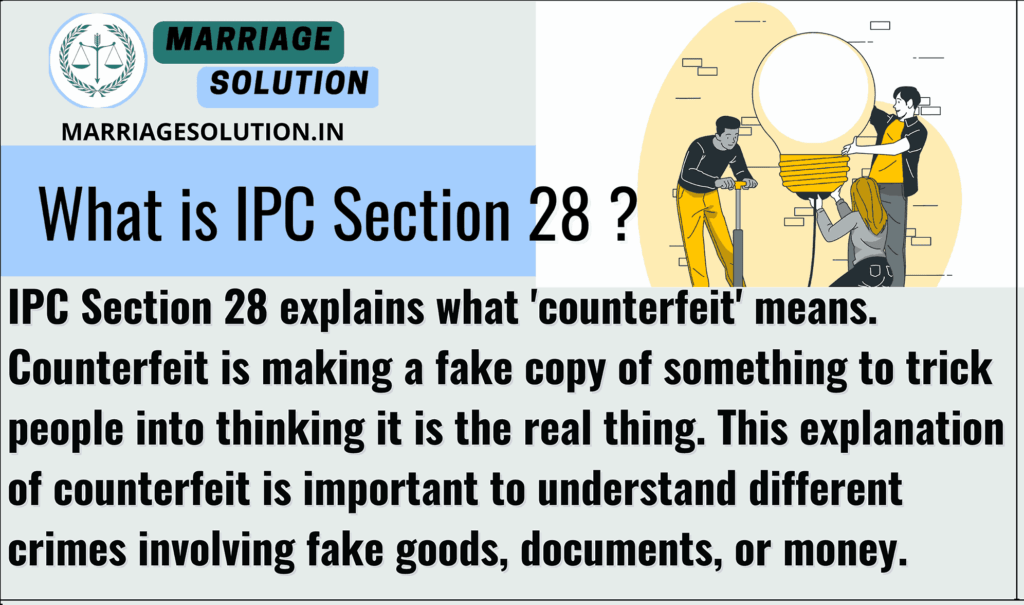Introduction of IPC 28
IPC Section 28 is an important part of the Indian Penal Code that defines the term “Counterfeit.” This section is crucial for understanding various offenses related to the production or use of counterfeit items. Knowing the definition and implications of “counterfeit” helps in interpreting and applying the law effectively.
What is IPC Section 28 ?
IPC Section 28 explains what ‘counterfeit’ means. Counterfeit is making a fake copy of something to trick people into thinking it is the real thing. This explanation of counterfeit is important to understand different crimes involving fake goods, documents, or money.

IPC Section 28 Overview
IPC Section 28 defines “counterfeit” as making an imitation of something with the intention that it will be mistaken for the original. This definition is significant for determining the nature of various criminal acts involving counterfeit goods, documents, or currency.
Key Points Explained
- Definition of Counterfeit:
- Counterfeit means making an imitation of something with the intent to deceive.
- This definition helps identify when a person is involved in creating or using fake items. For example, producing fake currency or documents is considered counterfeiting.
- Intention to Deceive:
- The key element is the intention to deceive others by making them believe the imitation is genuine.
- The focus is on whether the person intended to mislead others. For instance, if someone prints fake money to use it as real currency, this is counterfeiting.
- Application in Law:
- IPC Section 28 is applied in cases involving counterfeit goods, currency, or documents.
- This section helps identify and prosecute individuals involved in creating or using counterfeit items. For example, in a case of fake currency distribution, proving the intention to deceive is crucial for a conviction.
- Legal Interpretation:
- Courts use IPC Section 28 to interpret acts of counterfeiting.
- Judges refer to IPC Section 28 to determine whether the actions in question were meant to deceive others. This helps in delivering fair judgments. For example, in a case of counterfeit documents, the court will look at whether the accused intended to deceive by using fake documents.
- Comprehensive Coverage:
- IPC Section 28 covers a wide range of counterfeiting activities.
- This ensures that all actions involving counterfeit items are addressed under the law. It provides a comprehensive framework for identifying and prosecuting counterfeit acts, whether it’s currency, goods, or documents.
- Judicial Precedents:
- Previous court rulings based on IPC Section 28 guide future cases.
- Court decisions from past cases involving IPC Section 28 set precedents that influence future rulings. This ensures consistency and fairness in legal proceedings.
28 IPC Punishment
- Punishment:
- General Punishment: Section 28 itself does not prescribe specific punishments. However, it is used in conjunction with other sections of the IPC.
- Specific Crimes: For example, crimes like counterfeiting currency fall under Sections 489A to 489E, with severe penalties including imprisonment up to life.
- General Fines: Fines under IPC Section 28 depend on the specific offense and the related sections of the IPC.
28 IPC bailable or not ?
Whether an offense involving IPC Section 28 is bailable or not depends on the specific offense and the sections of the IPC that describe the offense. Generally, the bailability is determined by the nature of the offense defined by the accompanying sections. For instance, some offenses like minor forgery might be bailable, while more serious crimes like counterfeiting currency might not be.
Section 28 IPC in short information
| Aspect | Details |
|---|---|
| Definition | IPC Section 28 defines “counterfeit” as making an imitation of something with the intent to deceive. |
| Offense | Involves making or using counterfeit goods, currency, or documents. |
| Punishment | No specific punishment under IPC Section 28; depends on related sections describing the actual offense. |
| Bailable or Not | Depends on the specific offense and related sections of the IPC. |
IPC 28 FAQs
What does IPC Section 28 define?
IPC Section 28 defines “counterfeit” as making an imitation of something with the intent to deceive.
Does IPC Section 28 prescribe any punishments?
No, IPC Section 28 does not prescribe specific punishments. It defines counterfeiting, which is used with other sections to determine penalties.
Is an offense involving IPC Section 28 bailable?
The bailability of an offense involving IPC Section 28 depends on the specific offense and related sections of the IPC.
How is “counterfeit” used in legal proceedings?
“Counterfeit” is used to interpret the intent behind various criminal acts, aiding in prosecution and judgment.
“Counterfeit” is used to interpret the intent behind various criminal acts, aiding in prosecution and judgment.
Court or any other marriage-related issues, our https://marriagesolution.in/lawyer-help-1/ website may prove helpful. By completing our enquiry form and submitting it online, we can provide customized guidance to navigate through the process effectively. Don’t hesitate to contact us for personalized solutions; we are here to assist you whenever necessary!
